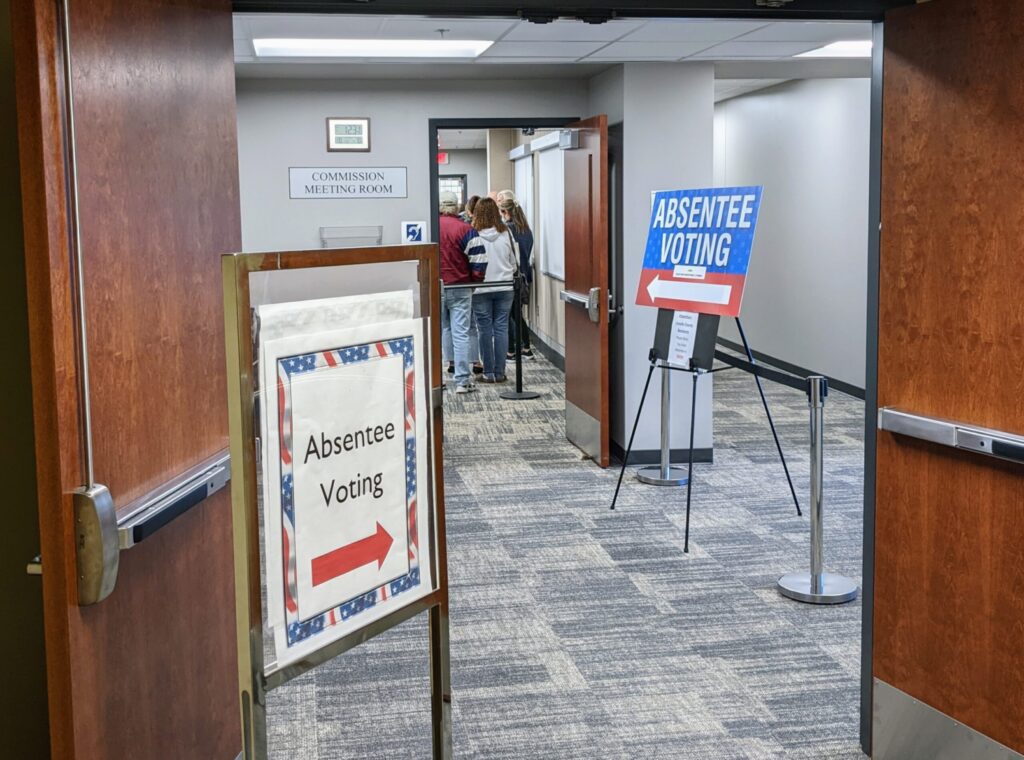
Seth Tupper, Joshua Haiar – South Dakota Searchlight
The assertion that election officials are not being threatened or intimidated in South Dakota helped derail legislation this week at the Capitol in Pierre that would have criminalized those acts.
Yet a South Dakota county election official published an article last month detailing verbal abuse suffered by her staff. And another county election official said this week that her office faces “intimidating” tactics from members of the public.
The article is from Susan Kiepke, the auditor of Davison County, which has its county seat in Mitchell. The National Association of Counties published the article Jan. 29 under the headline, “Rural county elections staff face harassment, misinformation.”
Kiepke wrote that she has asked the sheriff’s office to attend each county commission meeting, reduced the number of precincts and poll workers in her county, and asked for security at the courthouse while ballots are being counted on election nights, all due to safety concerns.
“I hate that elections have gotten so negative,” Kiepke wrote. “I used to look forward to them. They were fun and people were happy. Now people come to my office and verbally attack myself and my staff.”
“I never know when folks will show up,” she also wrote, “to try to convince our commissioners that the DS850 scanner and tabulator that we use to count ballots has a microchip in it that feeds information to Russia.”
On Wednesday, former legislator and current Gregory County Auditor Julie Bartling said her office fields similar questions about vote-counting machines at the courthouse in Burke.
“It’s not threatening, but it can be intimidating,” Bartling said in an interview with South Dakota Searchlight.
The most frustrating aspect of it, she added, is that the questions and suspicions come from people she’s known for years.
“And they point-blank say, ‘I don’t believe you,’” Bartling said. “They don’t believe that what I’m saying is true, that state law dictates that the machines cannot be connected to the internet, and they’re not, but they don’t believe me. And they tell me that.”
To protect auditors and their employees and election workers, Senate Bill 20, introduced during the current legislative session, would have established the crime of threatening or intimidating election workers with the intent to improperly influence an election. The crime would have been a Class 1 misdemeanor punishable by up to a year in jail and a $2,000 fine.
The bill passed a state Senate committee 8-0, the full Senate 23-10 and a House committee 8-5. Then it failed 24-46 on Tuesday in the House.
Rep. Rebecca Reimer, R-Chamberlain, spoke in favor of the bill on the House floor. Rep. Bethany Soye, R-Sioux Falls, asked her, “Did you say that this has been happening in our state, that poll workers are being threatened?”
Reimer answered, “I did not say poll workers are being threatened, but they have in other states. And no, I do not have an example for you.”
Rep. Liz May, R-Kyle, picked up on Soye’s point later in the debate.
“We haven’t had any of this in South Dakota,” May said. “None of this.”
Rep. Phil Jensen, R-Rapid City, said the “vagueness” of the bill reminded him of a report he read on the events of Jan. 6, 2021, about “hundreds and hundreds and hundreds of fellow American patriots who were imprisoned because they were in the wrong place at the wrong time.”
“Some were incarcerated without any evidence, just dug up, pulled out of thin air by the prosecutors in D.C.,” Jensen said, before being cut off by Speaker Hugh Bartels, who ordered Jensen to address his remarks to the bill.
A congressional committee determined and a federal grand jury has alleged that the Jan. 6, 2021, attack on the U.S. Capitol was part of a coordinated effort led by then-President Donald Trump to subvert the 2020 election. More than 1,200 people have been charged with crimes in connection with the attack, resulting in more than 800 guilty pleas or convictions so far.
Meanwhile, election workers, staff and poll workers across the United States have seen a surge in threats in recent years, according to the MIT Election Data and Science Lab. A poll conducted by the Brennan Center for Justice last year found that 30% of local election workers in the U.S. said they have been abused, harassed or threatened because of their job.
In response, at least 14 states have passed legislation to protect election officials and workers since 2020.
